When people try to show or teach you how to SEO a website, they often over complicate things and to showcase just how they do this, here’s an illustration:
And each of those things inside the circle has it’s own plethora of tutorials. With all this information, is it any wonder why so many people get confused when they hear SEO or try to learn it?
Nope, I’m not surprised and I’ve been through that before. So forget that image (put an X in it like I did).
SEO is a topic that has many different viewpoints. Some people say that the best thing for it is backlinks, other people say that it’s content, and then you have a plethora of other different tutorials and explanations, and frankly, I believe this causes too much confusion (which one is right!?), especially if you’re a beginner and just want to know a solid way of doing it.
That is what I’m going to be doing in this article…
For over 10 years, I’ve been following the SAME exact SEO concept on all my websites, pages, and posts and it’s CONSISTENTLY produced positive results for me. And I want to explain just how powerful this is by showcasing one of my biggest websites that I’ve been using it on.
Have a look at a 1 year report on my biggest website and how it’s performing (SEO & Income wise):
This is exactly what I’m going to show you how to do here today. In short, my strategy provides the following results:
- More traffic.
- More rankings, more impressions on Google & other search engines.
- A good, steady growth in the above 2 things over a short and LONG period of time.
Now I’m not saying my approach to this is the best, but my results in applying the techniques I’ll show you over and over and seeing it work, again and again prove it’s a good way to go.
But besides that program, I still do recommend you read this article. Because…
I’m going to show you how to SEO a website, absolutely free:
And the way it’s going to work is like this:
First…
I’m going to run you through the basic idea of what you need to keep in mind when doing SEO, and why it’s not really complicated and why thinking it is causes you to focus on the wrong things, waste time, buy useless programs and get negative results.
Second…
Then I’m going to provide a SIMPLE example of how to do SEO on a single page on your website and you will use that reference and apply it on your own page/s.
So if you have a 1 page site, apply it there. If you have multiple pages, apply the same concept for ALL of them. This is exactly what I did on that website I showed you above with the 100k+ visitors.
Just by following this example that I’m going to show you and using it as a reference, I guarantee that you’re going to see better results faster than you think and the more often you apply this, the better it’ll get…
Let’s begin with this…understanding SEO (the none complex method):
As I said before, people who get involved with this business or preach about how to succeed in it often end up complicating it and more often than not, even the “experts” are wrong and miss the big picture of how it should be done and naturally, when they preach this, beginners also end up failing because they followed the wrong advice.
If you listen to the experts or fake experts today, here’s what you’ll probably hear them say about SEO:
- That it requires understanding Google algorithms.
- That it requires knowing how to backlink properly.
- That it requires having a PBN.
- That you need a social following, likes and shares.
- That you should or shouldn’t stuff keywords.
- That you need to know keywords.
- That you need content.
- That you need so and so, blah blah blah.
- Basically think of the image I had above (complicated nonsense).
And honestly, as I write this article, I’m starting to see a familiarity between this topic and something like weight loss topics, in that it’s always flipping around and there’s no concrete answer as to which thing works best.
Well that ends now, here’s what you need to know:
At it’s core, SEO is simply this:
It’s all about writing the BEST content you possibly can on a particular topic (especially major problems, man those are the best topics to write about!) to influence the people who read it. For example…
If I write an article on how to stop migraines and the content that’s written ACTUALLY works for people who read it, guess what? They’re going to love it.
The best answers to big problems get the BEST responses and those sites are the ones which get the highest rankings/rewards from Google. Repeating this concept for all the content you produce, whether it be on a page or video will only help you get more visitors, better rankings and better results.
Forget backlinks, forget PBNs, forget black hat marketing, forget all this complex stuff you’ve been taught, that’s missing what the truly important objective is (the core).
And the core is that you have to consider the person you’re writing for and write in a way that HELPS them with their issue, not the search engine and this is often flipped around by people who think they know SEO. It’s not.
This explanation makes SEO…
- Far more understandable.
- Far less scary.
- Far less complicated.
- Far more doable.
- And in practice, this is what I’ve seen that delivers the best results and I provided proof already for this.
Now of course, there are additional things you need such as keywords and relevant content and in the next stage of this article, I will include this, but you will see how I structure my content so that it makes the overall content I produce is…
- Easy to read.
- Easy to spot.
- Easy to understand.
- Easy to share.
- And easy to comment on.
All of which enhances the person’s reading experience who lands on my page.
Here we go. My personal SEO Tutorial (Step-by-step). Follow these in order…
Step 1: Research.
I always go for problem niche markets. Check out that link as it explains them thoroughly (they are called hungry niches). I used the example of getting rid of migraines above (it count as a hungry niche) so I’ll use this example again as reference.
What I aim to do with this niche market is help people solve that headache/migraine problem. Pretty simple objective, but that is what the site a success.
Note: You can also refer to hungry niches as evergreen niches.
So I will make a website on that and my central objective will be to attract this audience to my site and help them out, meaning ALL the content I write will be centered around the topic of helping people stop migraines.
Step 2: So after I make the niche decision, the next step is researching keywords.
I’m going to give you 3 ones I found just to keep this example short, but the basic idea I want to get across is that:
I am looking for keywords that are most directly associated with my niche (just use your imagination).
That is my starting point because each one I’ll find, I’ll write an article on and the more of this that I do, the better my website’s SEO success will improve.
And the most obviously, directed associated keywords are the ones which get the most traffic.
Plus I’ll also look up the most popular products for stopping headaches and review those. Those things are good keywords with generally lots of traffic.
Now I’m also going to make sure I target obvious, yet long tailed keywords, meaning:
I will never target keywords like: Headache or migraine. That’s just too broad and too competitive.
What I will target are things like:
- How to stop migraines.
- Ways to stop migraines naturally.
Things like that, they are obvious and long tailed keywords which are applicable to my niche audience.
So here are the 3 keywords I found based on this niche (with their keyword stats and competition). Also, once again, note that in this niche, I could find a lot more, but I’m sticking to 3 to keep this tutorial simple:
The question on competition is secondary to me, but to check if the keywords are good (and their competition), I use this tool.
Step 3: Optimizing your site for SEO.
This is actually a very simple concept. While there’s many ways to do this, my preference is this:
Buy a domain whose name is relevant to the niche topic. Something like Migrainesnomore.com is perfectly fine.
Install WordPress to the page you’re making. This platform is king for sites aiming to do SEO and it’s also beginner friendly).
Install the All in One SEO plugin. Here’s a tutorial on it. Basically this free plugin is going to help your site get noticed faster by Google once you publish new content.
Step 4: Time to write your content and make Google love it (10 tips).
Note: After you set up the first 3 steps above, you don’t have to repeat them, you will only have to repeat step 4.
So here’s one of the most important parts of this whole strategy. Up until now, all we’ve really done is prepare all the necessary things, the research, the keywords, the all in one SEO, all of this is great, but it’s a one time set up, and content production will really be the most important thing moving forward in all of this, so here’s how to do it:
Tip 1: You will need to take one of the keywords you find for your topic, and write extensively on it. I’m talking well over a 1,000 words. This will count as one article.
Tip 2: In that article, your keyword will be used in the title. Feel free to customize the title, add to it, flip the words around, but make sure the title of your article HAS the keyword AND sounds good (click bait type stuff).
Tip 3: In your first paragraph when you start writing the content, use the keyword just once, but use it in a way where it blends with the first paragraph.
Tip 4: I recommend using the keyword 1-5 more times throughout your article, and make one of the few times you use it an H3 heading, kind of like what I am doing in this article.
Tip 5: Within your content, externally link to authority sites. For example, I can link to Wikipedia pages on migraines. I will probably just do this 2-3 times throughout my article. Also link internally to other articles on your site to help people out. For example, if I wrote a review on a migraine pill that helps people, then I write an another article on how to stop migraine pain, I’ll link people in the new article to my old one where I wrote the review.
Tip 6: I will focus on writing in a way which:
A) Talks about the problem so I can get a quick reaction from my reader and
B) Tell them they are about to get a solution to the problem and explain it in detail throughout the article. Even better, if you have a personal story to share with this, DO IT. People love to know that there’s others who have the same problems and solved them.
Tip 7: Make sure you ask people their thoughts about what you wrote for them. Ask them if the advice helped or if they have questions, be welcoming of this. Encourage readers to talk to you, make them feel like they are safe to do it.
Tip 8: Include some sort of share button with your article so people can tell others about it. Use the free plugin called “Mashables share button”.
Tip 9: Don’t make your paragraphs long. See how I use it here, I don’t like to write too many blocks of text. 3-4 MAX, but usually 2 lines of text is enough, it make the reader feel like there’s less to overcome and makes your content more readable.
Tip 10: Add images throughout your article, and I encourage that you make them yourself (see how). Make sure your images are sized up such that people can glance at them quickly and keep reading your content. I prefer your put them on your right hand side of the content, as people prefer to read from the left to the right. And also, very important, INPUT the keyword you were chasing in your article within at least ONE of your images.
And if you need more examples and references, just check out my site, read my content, see what draws you in and mimic the style of writing, but in the end, make sure you get the point of how I’m writing and marketing and then evolve it through your own style to make it unique.
Plus, here’s a bonus, a sample article on how to do this:
Let’s say I used one of the keywords I found (natural remedies for migraines) and wrote content for it. Here’s an example of how it can look:
This should help you out when you write your articles.
And after all of this is done…
Publish the article and move onto the next one. Try to publish daily if possible.
You will repeat all of those same steps above for the next keyword you find, and the one after that, and so on, and this is a process that should never end because the more of this you do, the more SEO points you’ll get from Google, believe me on that, as I’ve used this same approach to write well over 1,000 articles on all of my sites, each of which repeats the same exact strategy.
If you can apply this strategy for 10, 20, 30 or more articles, here’s what’ll happen:
The following page you see is another site I started about a year ago. It’s definitely not as huge as the first one I showed you earlier, BUT it follows the same steps and in doing so, here’s what’s been going on:
If you can do what I just explained, your website’s SEO (and traffic numbers obviously) will 100% improve in every imaginable way. Don’t dwell so much on articles that don’t get high rankings quickly, it’ll happen faster and faster when you have more and more content published.
When I started one of my most successful websites (this one) all the way back in 2013, I would publish content and only see it rank in the top 2 pages within a few months.
After I wrote 50 articles or so following this strategy, suddenly articles would pop onto the 1st and 2nd page in a matter of weeks.
- After I crossed a 100 articles it would pop up on the first page faster, within days.
- Now that I have 100’s of articles, it happens within hours.
- And all of this is because my content base grows and I keep applying the same strategy.
Now do note that there’s people in niche markets who get these results with even less content and less work (I have other sites which get higher rankings with less than 50 articles total), but my niche topic on this site, which is making money online is quite packed with competition, so the results I get now are still great despite this obstacle.
But yeah, this is the strategy I’ve used consistently to get high rankings, good SEO results that will not get me penalized (white hat only!) and free traffic that buys.
Still need help? No problem:
In just a moment I’m going to recommend something that will basically guarantee you get this SEO strategy right, but before I do, let me just quickly tell you something regarding this article you just read:
In it, I wrote over 2,000 words (close to 3,000 after editing and adding more content) to explain how I optimize my website and content for SEO and frankly, it’s very simple once you start doing it for a few of your articles (you will see how automated it’ll become).
Try not to get too worried about if you’re targeting keywords correctly or if you’re optimized enough or not. If you’re following this strategy, you’re doing it right.
Focus on targeting the keyword in your title like I said and writing the type of content that will attract people and you will notice if this is working based on the number of people who comment on your site, your rankings, your traffic increase and more and when you do, you’ll know you’re going the right way.
But even if that still doesn’t help you and you need more guidance, here is what you should do:
I promise you guys, that the program I just recommended will be the best SEO teacher you need as all of my knowledge comes from there.

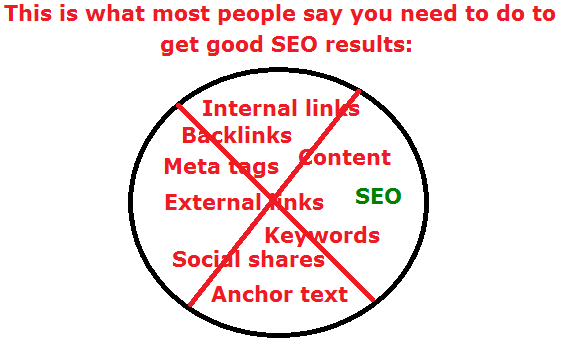
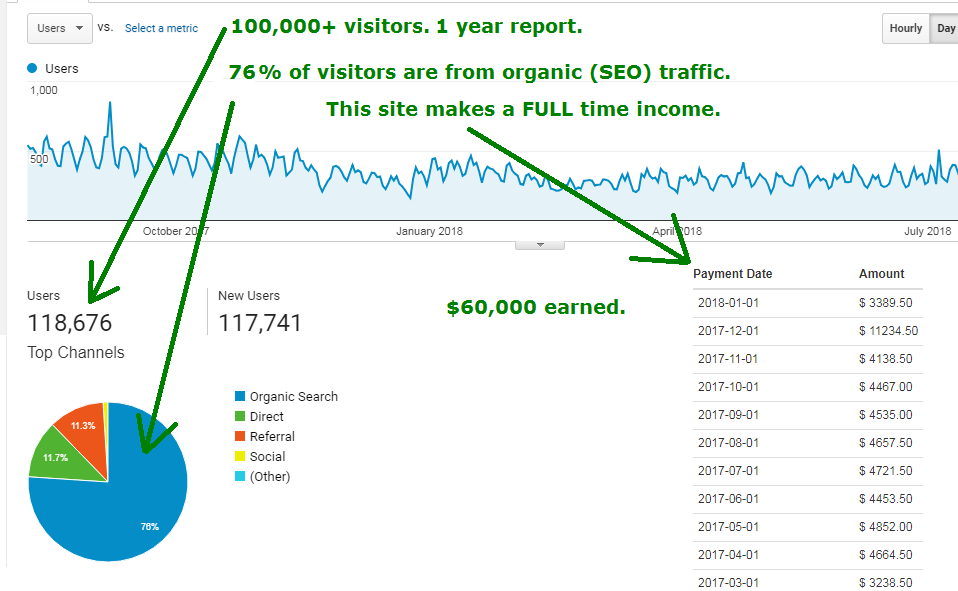


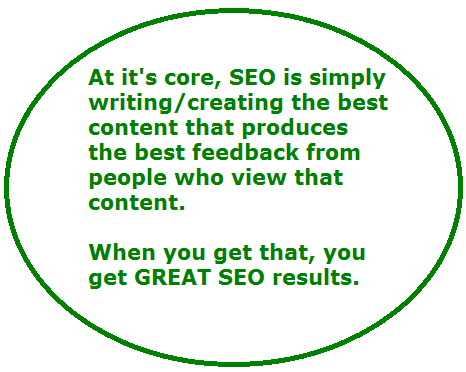

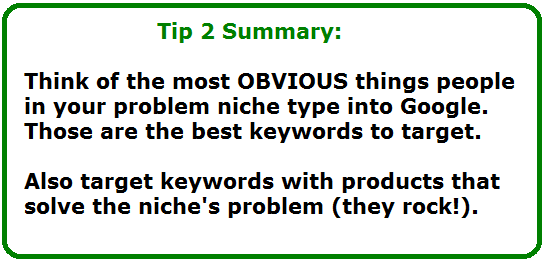



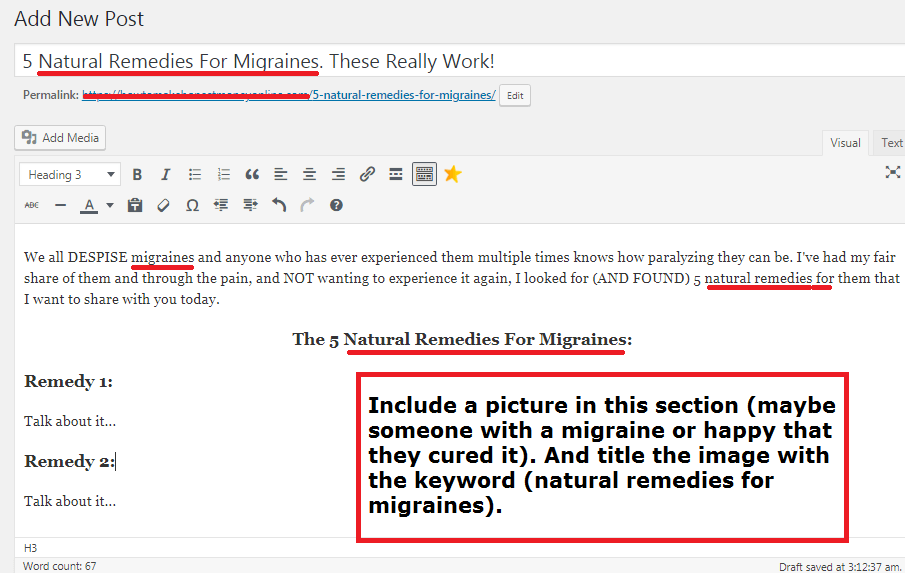
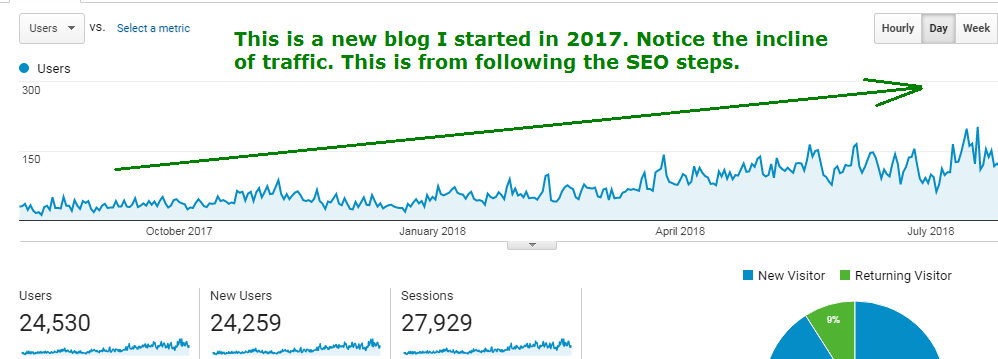

Hi Vitaliy,
I really enjoyed reading your article and like the idea of using images as part of your SEO strategy. I hadn’t thought of using keywords within the images but I can see how that would be another helpful way of getting people to your site.
Also linking to authority sites sounds like a good idea! I have heard that Google likes these kinds of links and they give your article a lot more credibility.
Thank you, I found a lot of useful information by reading your article.
Kerry
No problem Kerry, relevant images with keywords in them and external linking to authority sites is a must today.
Dude…your SEO strategy is a lot simpler than what the so-called gurus have been preaching. Even to this day the whole backlinking approach still has me all dazed and confused! Based on your article, as long as you publish good-quality content on a consistent basis with low competition keywords you should be fine. So what keeps you motivated to come up with all this content?
Thanks!
Well I enjoy writing and studying this topic Mark and it also makes me good money so there’s a good incentive lol.
Hello Vitaliy,
Wow, you can tell you have been doing this for a long period of time. The article was very well written. I found out a bit more about the SEO today thanks to you. The part that made me think a bit more about my articles was the keyword portion.
I instantly remembered why it takes so long to get indexed. I forgot to use the keyword in the title! They are throughout the article but not in the title. That mistake will be corrected now, thank you for the reminder.
Another item I noticed is the subtle way you advertised for your program. It is done tastefully and flows along with the article at the same time, you are doing an incredible job.
My niche market is drones, I have been using this method from the beginning and it does work if you remember all of the parts each time, lol. Your audience will benefit greatly from this article as I have.
Thanks again
Hi Timothy, I appreciate the kind words. Funny you mentioned doing a drone site, I actually have one too I write for time to time. I’ve written a case study on it here which you’re welcome to check out!
Hi Vitaliy, I always learned something interesting from your blog and today, you’ve touched on a topic that I am struggling with everyday. With over 300 posts, publishing at twice a week, I am only getting about 100+ clicks per day and almost 99% or them are not converting.
I’ve been sticking to the core – nothing flashy, just pure long tail, low competition keywords with content written based on what I regard as thorough research. What’s probably lacking is social engagement, but I am trying.
This month, my traffic dipped despite all the effort I’ve put into for the past few months so it’s a bit discouraging. What can I do to trouble shoot the problem when I don’t even know where my SEO problem is?
Thanks.
Hi Cathy, the thing is, what you told me here is detailed, but I would like to know more info as it’ll give me a clearer picture:
You mentioned having 100 CLICKS on the site daily (that’s a lot actually), but is actual clicks you get on your affiliate links OR is this actual visits you get to your overall site?
What is the niche subject of the site with the 300 blog posts?
Are you promoting 1 or several products on the site?
Let’s start there and I’ll see what I can to help boost your conversions.
Thanks for providing this article, it helps me to understand SEO in many ways!
I have a couple of questions though:
1. Is it better to write longer content or is there a minimum amount of words that should be used?
2. What about URLs? Is there a golden rule to follow when providing slugs for the pages?
Hi Simon, thanks for the questions, here’s what I have to say in regards to them:
1. Longer content is 100% better. I write about how much you should write here (1,500 words is a good min).
2. I assume when you say URLs, you mean either the domain name or the permalink when you write new content and it gets turned into a URL and added to your domain right?
Either way, for domains, I recommend keeping the name of it short but descriptive. And for permalinks, make sure they are short too. I have been sent messages by Google which said my titles and permalinks are good short, so ever since I’ve kept them short. BUT…
If you’re chasing a keyword, make sure both the permalink and the title contain it, that’s important.
I’m so glad I came across this article, saved me a lot of time in following the misinformation that I’ve recently picked up at an internet marketing forum (I won’t drop the name!).
Anyway – all the members of this forum seemed to be under the impression that backlinks were the holy grail – the more the merrier etc…
I’m also glad you mentioned the PBN angle – another route most so called gurus insist upon.
If you had to choose one SEO tool above all others – what would it be (and can I get it for free!!!!)
Hi Chris, I want to take a guess as to which forum you were referring to, was it by any chance the Warrior Forum? I say this because I often see a lot of misinformation like the type you mentioned being talked about there.
But anyway, regarding free tools, honestly there isn’t just one, there’s multiple ones:
A WordPress site, good training program and a good keyword tool. I’d say these 3 things are critical. And honestly, you can get ALL 3 of them through Wealthy Affiliate. Now you can try ALL of them for free within that site, but there is an upgrade. I talk about all of that in the review via the link to WA I just provided.
Thanks for your SEO 101 tutorial. While I’m still of the old school that keywords are important, I’m also still an advocate for backlinks. It’s because we write great content that we get backlinks. So backlinks are still important.
The issue is how we are getting the backlinks. From your article, I took away that by writing great content, it causes others to want to link back to us. Is that correct? Also, how will Google know your content gave the best answer?
Hi Shalisha, you are absolutely correct in following how good backlinks work out through great content creation. In terms of how Google figures out if you have good content, the answer is comments, shares and stay times on the website. If people are commenting, engaging with the site, sticking around for long periods, returning back to it, sharing it, all of these are signs they are getting a good experience and answers.
Even though I am not new at SEO, this article of yours has taught me a few things that even I had misconceptions about. And it has helped me see what I’m doing wrong and what I should be doing to make the first page of Google (most of my articles are on page 2). I will apply what you teach here and let you know of my results later… 🙂 Thanks a ton!
Hi Reyhana, I think you know more about SEO than you think given our previous conversations. The fact that you’re ranking on page 2 for most of the content you create is a great sign that it’ll soon hit the first page. When I started blogging and focusing on SEO, I had the same things happen to me where my articles would also generally rank on page 2 of Google before exploding onto the first page. I’m looking forward to the day this happens for you!
Great article Vitaliy! I remember when I was new in the world of blogging, everything seemed super confusing. Most of the time, I was more confused than before. I had to refer to a series of articles to get a clear idea about SEO. Love the way in which you have explained it clearly. A beginner would sure find this very helpful.
No problem! You will likely getting different viewpoints on SEO from different sources, but honestly, the very best one out of all of them is Google itself and reading it’s webmasters blog. They clearly lay out what it takes to get good SEO results and this tutorial I wrote basically says the same things.
Thanks for the article! I just began my blog and sometimes, the quantity of the information out there is overwhelming. You wrote them clearly and in order! I’m really grateful for this! You said to buy a domain relevant to my niche. Is this important for Google or just for the viewers?
More so for the viewers than Google. You can have a site with your name as the domain and rank for anything you post content on, but for building a business, it’s better to identify quickly what the page is about, and a good name that lets viewers know this is the best way to go.